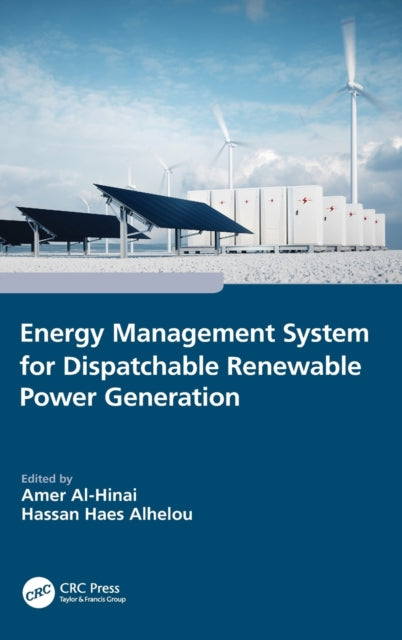Shulph Ink
Energy Management System for Dispatchable Renewable Power Generation
Energy Management System for Dispatchable Renewable Power Generation
YOU SAVE £3.94
- Condition: Brand new
- UK Delivery times: Usually arrives within 2 - 3 working days
- UK Shipping: Fee starts at £2.39. Subject to product weight & dimension
Bulk ordering. Want 15 or more copies? Get a personalised quote and bigger discounts. Learn more about bulk orders.
Couldn't load pickup availability
- More about Energy Management System for Dispatchable Renewable Power Generation
Modern power systems heavily rely on power electronics converters for controlling and stabilizing power flow. Increasing the hosting capacity of renewable generations and familiarizing with emerging technologies are crucial for the development of power electronics dominated power systems.
Format: Hardback
Length: 262 pages
Publication date: 30 November 2022
Publisher: Taylor & Francis Ltd
Power electronics has played a pivotal role in the development and advancement of power systems. With its ability to efficiently convert and control electrical power, power electronics has become an essential component in modern power systems. This article will explore the various aspects of power electronics, including its dominance in power systems, the control of power electronics converters, understanding the control and stability of power converters, increasing the hosting capacity of renewable generations in modern power systems, and familiarizing with applications of emerging technologies in power electronics dominated power systems.
Power electronics has emerged as a dominant technology in power systems due to its ability to efficiently convert and control electrical power. It has revolutionized the way power is generated, transmitted, and distributed, enabling the integration of renewable energy sources into the grid and improving the overall efficiency of power systems.
One of the key challenges in power electronics is the control of power electronics converters. Power electronics converters are used to convert electrical power from one form to another, such as from DC to AC or from AC to DC. They are also used to control the power flow in power systems, such as inverters, rectifiers, and switches.
The control of power electronics converters is critical for the stability and reliability of power systems. Proper control of power electronics converters can ensure that power systems operate at their optimal efficiency, minimize power losses, and improve the overall performance of power systems.
Understanding the control and stability of power converters is essential for the development of efficient and reliable power systems. Power converters are subjected to various disturbances and uncertainties, such as changes in input voltage, load conditions, and environmental factors. Understanding the control and stability of power converters can help engineers develop effective control strategies to mitigate these disturbances and ensure the stability of power systems.
Increasing the hosting capacity of renewable generations in modern power systems is a significant challenge. Renewable energy sources, such as solar, wind, and hydroelectric power, are becoming increasingly popular due to their environmental benefits and low operating costs. However, integrating renewable energy sources into power systems can pose challenges, such as power fluctuations, voltage fluctuations, and power quality issues.
Power electronics can play a crucial role in increasing the hosting capacity of renewable generations in modern power systems. By developing efficient power electronics converters and control strategies, engineers can improve the efficiency of renewable energy sources and reduce the impact of power fluctuations and voltage fluctuations on power systems.
Familiarizing with applications of emerging technologies in power electronics dominated power systems is essential for the development of future power systems. Emerging technologies, such as artificial intelligence, machine learning, and the Internet of Things, have the potential to revolutionize the way power is generated, transmitted, and distributed. By understanding the applications of emerging technologies in power electronics dominated power systems, engineers can develop innovative solutions to meet the growing demand for energy and improve the efficiency and reliability of power systems.
In conclusion, power electronics has played a pivotal role in the development and advancement of power systems. With its ability to efficiently convert and control electrical power, power electronics has become an essential component in modern power systems. The control of power electronics converters, understanding the control and stability of power converters, increasing the hosting capacity of renewable generations in modern power systems, and familiarizing with applications of emerging technologies in power electronics dominated power systems are critical challenges in power electronics. By addressing these challenges, engineers can develop efficient and reliable power systems that can meet the growing demand for energy and improve the quality of life for people around the world.
Weight: 520g
Dimension: 162 x 239 x 25 (mm)
ISBN-13: 9781032309583
This item can be found in:
UK and International shipping information
UK and International shipping information
UK Delivery and returns information:
- Delivery within 2 - 3 days when ordering in the UK.
- Shipping fee for UK customers from £2.39. Fully tracked shipping service available.
- Returns policy: Return within 30 days of receipt for full refund.
International deliveries:
Shulph Ink now ships to Australia, Belgium, Canada, France, Germany, Ireland, Italy, India, Luxembourg Saudi Arabia, Singapore, Spain, Netherlands, New Zealand, United Arab Emirates, United States of America.
- Delivery times: within 5 - 10 days for international orders.
- Shipping fee: charges vary for overseas orders. Only tracked services are available for most international orders. Some countries have untracked shipping options.
- Customs charges: If ordering to addresses outside the United Kingdom, you may or may not incur additional customs and duties fees during local delivery.


